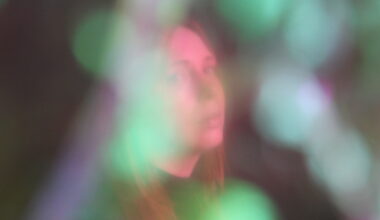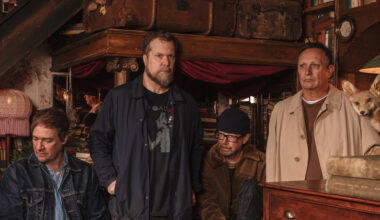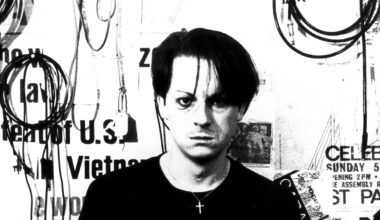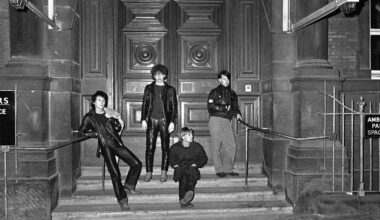Silent since 2004, the return of Hull’s finest with a brand-new EP is cause for some celebration. Parking up in the nearest hostelry, sit back and enjoy the very good company of Fila Brazillia
It’s the final round of an imaginary quiz show and you’re trying to win a caravan. The host shows you a photograph of a 1990s electronic duo: 10 seconds to name them and the caravan’s yours. A raft of electronic twosomes float through your memory: Chemical Brothers, Orbital, Basement Jaxx. Were Rednex a duo? “Think harder!” screams the host as the steamroller trundles ever-closer towards the caravan…
Back in the real world. It’s a blustery Wednesday afternoon in early 2020 and I’m sat in a pub with Steve Cobby and David “Man” McSherry from Fila Brazillia. They’re one of the most prolific production outfits of the 1990s and almost certainly the band you couldn’t quite name in the imaginary quiz show.
In their heyday, they produced scores of remixes for the likes of Sneaker Pimps, Busta Rhymes, Radiohead and The Orb. And yet there was a weird alchemy at work with Fila: despite their music being used on ‘CSI’, ‘Sex And The City’ and Chris Morris’ seminal surreal sketch show ‘Jam’, they just kind of… disappeared.
We’re huddling over steaming cups of tea to talk about their new EP ‘MMXX’, their first fresh material since 2004’s ‘Dicks’ (almost French for 10, the number albums they’d released). Highlights of the EP include the gently loping acid of ‘A Machine To Live In’ and the glittering ambient LSD trip of ‘Midnight Friends’. It’s a surprise to have them back because it was assumed Fila Brazillia were lost to history’s herbal ether. And yet it’s a comeback they have remained carefully tight-lipped about.

The idea for this new release bubbled up in a laid-back Fila fashion. It started with a recording of their performance at Japan’s Fuji Rock Festival in 2000, where they were on the same bill as Moby, Toploader and Primal Scream. The video wasn’t in a UK format so after one viewing it was quickly despatched to the back of a drawer. It was Cobby who blew the dust off the old tape a couple of years ago.
“I got it transferred by one of those video production companies that turn your wedding into a hideous DVD memory,” he says. “In Japan, they produce audio meticulously, so it was fantastically recorded. We put it out as an archive recording [2018’s ‘Played In Japan’] and that got the ball rolling in terms of releasing things again.”
With the wheels tentatively back on their collaborative project, they began emailing each other chunks of music until something emerged. No MIDI, just audio, and no explanation to skew the direction of the other musician.
“I sent Man a really shit rhythm track, and he sent me a full song,” says Cobby. “I was just expecting a couple of chords! We’d always been on the same page musically, so I would have been surprised if he’d sent something back that was…” Cobby holds his nose and makes a phooey sound.
“It came as a surprise, but it fell at the right time for me,” says McSherry. “I’d had some time off work. I was sat in my pyjamas so I started fannying about and it ended up somewhere really interesting.”
Sitting around in their pyjamas might be a metaphor for the vibe of Monsieurs Brazillia. The pair never had a grand plan for their career. They’d met on a night bus in the 1980s following McSherry’s stint as goth guitarist for short-lived band Punctured Tough Guy.
Some years into their friendship, drinking buddy Dave “Porky” Brennand approached them about releasing their debut track ‘Mermaids’, and so Fila Brazillia was born – named after the banned bull mastiff Fila Brasileiro, in case you were wondering. That first release also birthed Pork Recordings, a company that would have put Hull on the musical map if it hadn’t already given us The Housemartins, Cosey Fanni Tutti and, er, Joe Longthorne.
“It all started off in Man’s flat,” says Cobby, “borrowing drum machines or four-tracks, undoing and reversing tapes. We were in separate proper bands so it was an escape to get involved in fuckery.”
He says this last word with such relish.
But Fila had difficulty building on the momentum of 1991’s ‘Mermaids’, particularly as the follow-up flopped.
“We were still scraping away,” remembers Cobby. “Man had to go to college, I was on the dole. With our first album ‘Old Codes New Chaos’, it took us a year to sell the 1,000 copies we pressed. We were still waving a flag above the parapet, hoping to be noticed.”
Acclaim did come, with Fila and the Pork imprint filling the gap between the cut-up beats of DJ Food and the smooth instrumentalism of Acid Jazz – their music was custom-made for a ‘Smokers Delight’ generation. They liken their reputational rise as going from being a cosy neighbourhood grocer’s to becoming a shiny Tesco’s superstore. That extra pressure resulted in an amicable split from Pork Recordings as Cobby and McSherry looked to build on their success via their own labels, Tritone and Twentythree.
“We didn’t have the infrastructure to take it to the next level,” says Cobby, “which was really frustrating because we could have cleaned up. Critically acclaimed doesn’t even begin to explain it. But it was mismanaged.”
More than once, he drizzles a bittersweet sarcasm over that phrase “critically acclaimed”.
“The whole thing became quite expensive to sustain,” says McSherry. “We were taking a wage, and there’s rent on the studio. I was skint so I thought I’d better do something else.”
“The drink and the luck ran out,” says Cobby.
Their lack of a Groove Armada-style breakthrough wasn’t for want of trying. Including their DJ mix album ‘Another Late Night’, brilliantly placing the zeitgeisty Nightmares On Wax and David Holmes alongside Marvin Gaye and John Barry, they produced at least one album virtually every year between 1994 and 2003.
“We put out 10 albums of original material,” says Cobby. “We weren’t handcuffed by the idea that you write, release and tour, so it wasn’t like you only got an hour’s worth of material every few years.”
I search for a comparison. I tell the guys that I thought it was a shame Leftfield only produced two coffee-table albums in the 1990s despite a brilliant slew of dancefloor-destroying 12-inches, and that I’d rather have my favourite bands constantly prolific.
“It’s other musicians that are tardy,” says Cobby. “It’s not hard to make music. Plumbers don’t get plumber’s block. Once you’ve got the means of production, it should be a cornucopia, like a horn of plenty.”
“We used to do a four-day week,” says McSherry. “They were long days, but it wasn’t exactly slogging our guts out.”
“It was the Kraftwerk model,” explains Cobby. “We punched in and punched out.”
They also fought against changes in music technology, which developed insanely quickly in the 1990s as it became easier to home record. They had a mixing desk with the requisite synths, guitars and microphones, but McSherry says they “couldn’t be arsed to mic things up so it became more and more about the computer. In the early 90s, playing instruments was really hard to capture, so there was no audio apart from a bit on DAT or a sampler with 10 seconds of memory: it was all just MIDI. So the beat-making was done inside the software”.
Which meant lots of looking at the backs of each other’s heads in the studio, they say. Listening rather than performing.
“We were from a playing background,” says Cobby, “and that’s why we could never get off on the programming side of things. It was never, ‘Oooh, see how I clicked that mouse just then’.”
He laments the habit of programming drums through keyboards.
“What an alien concept to turn this big muscular thing into two fingers.”
“We kept a live element when mixing down, using delays in real time,” says McSherry. “We wanted it non-loop based. There’s an unmixed quality to the early stuff: it feels like a stereo-out from a live gig desk, and if all starts to crackle and overdrive, never mind.”
“I prefer that naive approach rather than an FM gloss,” adds Cobby. “There’s no straight lines in nature. Keep that rawness – leave in a bum note hither and thither.”
When the Fila fellas talk about how hard they worked at their old career, I can sense the slight let-down that they never hit the brightest lights. But they’re clearly confident in how much they were loved, albeit by a fanbase that skewed nerdy and forum-commenty rather than anything more glamorous (“I thought we were a sexy band,” deadpans a disappointed Cobby). And they are proud that they didn’t bow to trends, they stayed stubbornly independent.
“The wings drop off fast on a bandwagon because everyone’s jumped on it,” says Cobby. “We were never on the bandwagon. We were waving it past, all mud-splattered, and our wives were going, ‘You should have been on that, you missed it again!’.”

During Fila’s downtime, McSherry wrote soundtracks while pursuing a career teaching music production, and Cobby kept an active involvement in studio work. He’s been busy making tunes with Stephen Mallinder, Richard H Kirk and his former label pal Porky. His Déclassé imprint hosts his own solo releases, the latest of which, last year’s ‘Sweet Jesus’, boasts a cover image depicting an acid-scrubbed George Michael doppelganger. Beautifully terrifying. And all along, Cobby’s trying to get better at the basics. He decided his drumming was “rank” and bought an Alesis MIDI kit for his garden studio – The Shedio – as a regular drum kit wouldn’t fit.
“I saw a clip of Anderson Paak doing an NPR Tiny Desk concert, and I thought getting a vibe going in an office, on a dinnertime, was amazing. That’s how I wanted to drum: a lovely groove, super basic. So I’ve been getting an hour on my kit every day – I’m at the point now where I can get rhythm patterns down really fast. My keyboard playing needs to come on next.”
As we’re talking in the pub, the past pays an unexpected visit. McSherry is talking about composition when suddenly Cobby’s phone rings. His ringtone is the ‘Mermaids’ melody, the track that started it all three decades ago.
“That’s the most amazing jukebox ever,” says McSherry as our interview comes to a temporary halt. We order more tea.
The modern world is something the pair will have to navigate in promoting the new EP. They’ve got email down pat, as we’ve established, but what about social media and self-promotion? They were known for being reclusive back in the 90s, so people assumed they were some kind of mysterious south American collective (“We weren’t aloof in person,” insists Cobby. “Maybe it just looked like that”).
They’re still slightly private – they’ve spoken to no one other than Electronic Sound about their reunion – but it’s tough to be cagey in an online world. But it’s alright, they’ll be OK. Jump on the Fila Twitter account and you’ll see McSherry’s reminiscences of classic releases. Cross over to Cobby’s Instagram, and you’ll watch him noodling in his studio.
“I started putting up videos so people can have a peek at the writing process,” says Cobby. “If you’re an owner-operator like me, content is king. Get those algorithms going! Throwaway posts get brilliant feedback, and things you really like don’t get any reaction. It’s your first level of critique.”
“Does it take long to put them together?” says McSherry.
“No. I record everything I do and put it through iMovie. There isn’t any slick editing,” says Cobby.
“I think it’s really brave, exposing yourself to the world,” says McSherry, who I suspect is a more reluctant social media user. “I can’t really do Facebook posts. I was trying to share from my own account and I shared a comment instead. I feel like a bit of a pleb when it comes to all that!”
This embracing of their own social output reinforces the fact this relaunch will be as independent as ever.
“We’re not marketable,” says Cobby, who had approached major electronic music labels with his solo material, but came up against a brick wall. “There can’t be that much weight in the heritage. Then again, it was never about trying to build an empire. Self-releasing allows us the freedom to do what we want, when we want. It’s how we operate best.”
Our pub session is over. The tea has run dry and they need to tootle off. Things to do. For such a laid-back duo, their productivity was impressive. Even now, they seem to juggle plenty of projects, including family commitments, which have always had a presence in their career.
“When Fila was first happening, my kids were really little,” explains McSherry, “and in the mid-period of Fila, Cobby’s were little. Now in this period, I’ve got little ones again.”
“We can’t put a record out unless one of us has got tiny babies!” says Cobby. “All power to you for being able to do all that plate spinning.”
“I’m clinging on,” says McSherry. “Look at my grey hair!”
I back off and let these two old friends catch up before they head off. My mind returns to the imaginary quiz show, the one in which I’m about to win a caravan. How could anyone forget the name of Fila Brazillia, a duo that, in their 90s/00s heyday, produced more studio albums than Leftfield, Basement Jaxx and Groove Armada put together? That’s an impressive kind of alchemy.
‘MMXX’ is out now on Déclassé






